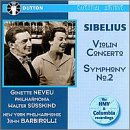| All Artists: Sibilius, Neveu, Susskind, Barbirolli Title: Sibelius: Violin Concerto, Symphony No. 2 Members Wishing: 0 Total Copies: 0 Label: Dutton Labs UK Release Date: 6/9/1998 Album Type: Import Genre: Classical Styles: Forms & Genres, Concertos, Historical Periods, Modern, 20th, & 21st Century, Instruments, Strings, Symphonies Number of Discs: 1 SwapaCD Credits: 1 UPC: 763587501628 |
Search - Sibilius, Neveu, Susskind :: Sibelius: Violin Concerto, Symphony No. 2
 | Sibilius, Neveu, Susskind Sibelius: Violin Concerto, Symphony No. 2 Genre: Classical
|
Larger Image |
CD Details |
CD ReviewsTwo facets of Jean Sibelius 01/10/2004 (5 out of 5 stars) "
Ginette Neveu's justly famous performance of this masterpiece is much more than just a "performance" : It is a historical document, a key version of the Concerto, luckily available on disc thanks to Dutton's admirably rejuvenated reissues. The distinctive 1945 Abbey Road Studio recording (made under the auspices of Walter Legge) was formerly issued on EMI. Most music lovers who know will insist that her magnificent playing has never been outclassed. Even the great Heifetz doesn't quite equal the beauty of tone, the fresh vitality and Nordic luster captured by Neveu. The merit of Heifetz, however, besides making the work publicly known in the first place, resides in performances of high energy and icecold steel accuracy (the prodigious 1959 RCA stereo recording is justly famous whereas the 1935 mono archive---revived on Naxos---is yet another outstanding example of his artistry). Neveu's emotionally charged performance, played with virtuose skill, unearths a few more subtleties ; in the end, her vision of the Concerto seems a little more "to the point", notwithstanding Heifetz's sheer excellence. The orchestral accompaniment directed by Susskind is consistently appropriate. John Barbirolli's renowned 1940 recording of the great Second Symphony is a powerful statement by one of the major conductors for this music. We feel that the involved forces were huge. The New York members were fully committed ; for numerous reasons the reading is one of the finest i've heard---power, precision and intensity are all constituent of the performance. I like it much more than the impetuous and slightly inflated Koussevitzky/Boston reading (by stark contrast to the rest of his Sibelius recordings, which i admire). Barbirolli's NY reading is energized and his musical speech is highly strung and austere : In it he finds Toscanini's ebullience and Koussy's ignited character. The quality of sound (Dutton) is quite satisfactory. Obviously not of the same class as the (unsurpassed?) 1962 R.P.O. account, the Barbirolli/New York recording is still one of those things worthy of the term "significant" and is, indeed, a whole lot more stirring than the Halle versions. For the two performances, showing two facets of the composer from Ainola, this album is a winner on all counts. " |

 Track Listings (7) - Disc #1
Track Listings (7) - Disc #1